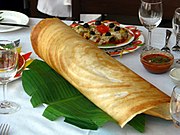3.1. Paco didn't like too much spicy food
 |
 |
 |
| By Kspoddar. Creative Commons |
By Kspoddar. Creative Commons | By warriorgrrl. Creative Commons |
Answer: Paco did not write (or didn't write) a letter to his family.
Paco (ARRIVE) in London two hours ago. He (TRAVEL) from Madrid Barajas to London Heathrow. He (WAIT) for his luggage at the airport and then he (TAKE)the tube to the town centre, where he hadn't previously made a reservation. When he arrived at the hotel, Paco (BE) a bit excited, so that he (LEAVE) his things there and (GO OUT) for a walk along the streets of London.
London (SEEM) an incredible city for Paco. He (OBSERVE) with attention everything and everywhere around him. But Paco was extremely tired. Now it is midnight in London. Finally, he (GO) to bed some time ago.
Take-out (in North American English), carry-out (in U.S. and Scottish English), take-away (in England, Australia, Hong Kong and Ireland) or parcel (in Indian English), is food purchased at a restaurant but eaten elsewhere. The restaurant may or may not provide table service. In the United States and Canada, food ordered this way (especially in fast food) is ordered to go, and in the United Kingdom it is ordered to take away or sometimes to eat out, as opposed to eating in.
In some cases, there are facilities for customers to order food by telephone, fax, or over the Internet, to be collected or delivered. This trend is thought to be on the rise as many small businesses take to the Web to promote their take-outs.
Food that is delivered by a restaurant to a customer (often called delivery) is also sometimes called take-out. Establishments that sell take-out exclusively without providing table service are called take-out restaurants or take-aways.
 |
 |
 |
| By Rainer Z. GNU license |
By Solipsist. Creative Commons |
By Kbh3rd. Public domain |
Certain types of food that are normally served in sit-down restaurants are commonly available as take-out. Pizza is one example: some pizzerias and chains have no tables, and supply for take-out and delivery only. Another classic take-out food is Western-styled Chinese food. In the past few decades, as immigrants from more and more Asian countries emigrate to the West, more and more types of cuisine are available: Japanese, Thai, Korean, Vietnamese, etc. In the UK, Indian food is also a popular form of take-away as well as kebabs from the Middle East.
Some businesses have taken a cue from the ever increasing popularity in takeout, and have created franchises to deliver food from restaurants which do not themselves deliver.
Adapted from Wikipedia.